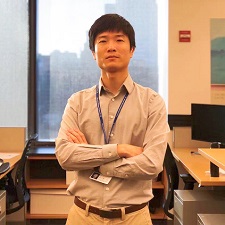Tin Yi Chu, PhD
Tin Yi Chu, PhD

Cancer cells form complex interactions with the various normal cells in their environment, including immune cells, fibroblasts, and blood vessels. These interactions are essential for cancer cells to grow, evade immune surveillance, and become metastatic or resistant to certain therapies. Spatial transcriptomics refers to a method of visualizing the distribution of RNA molecules in a tissue sample, allowing us to assign specific cell types to their locations. Dr. Chu [William Raveis Charitable Fund Quantitative Biology Fellow] aims to develop a statistical framework to infer how different cell types interact with each other based on spatial transcriptomics data. He will use this statistical framework to study cell-cell interactions in both colorectal cancer and inflammatory bowel disease, a risk factor for colorectal cancer.
Dr. Chu will develop a hierarchical Bayesian statistical model to deconvolve the spatial transcriptomic data and then resolve cell type-specific information. Based on the deconvolved spatial data, he will then deploy a Bayesian spatial model to infer the interaction between various cell types.
